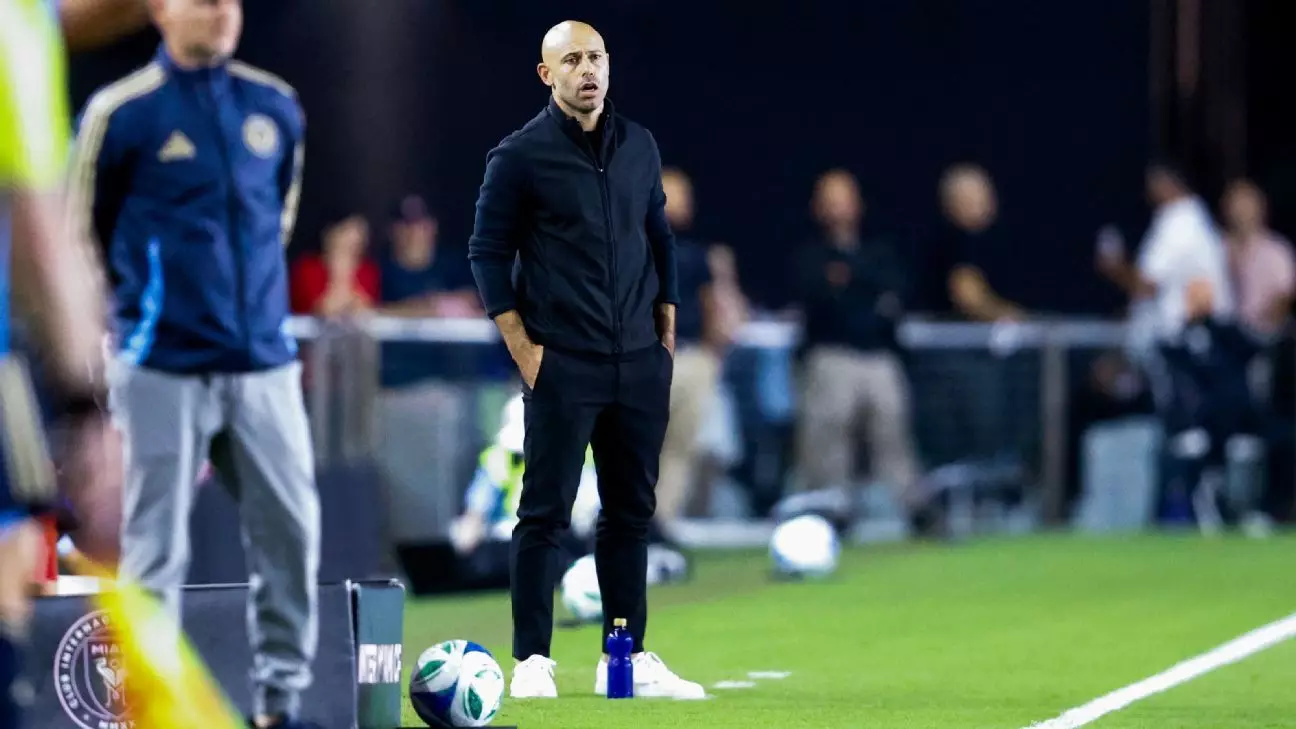The clash between Inter Miami and LAFC in the Concacaf Champions Cup quarterfinal ignited a firestorm of controversy that extended far beyond the pitch. Following a pulsating first leg at BMO Stadium, head coach Javier Mascherano did what many coaches might refrain from: he openly criticized the match official’s call regarding a yellow card issued to LAFC’s Nathan Ordaz. In an era where VAR technology is employed to enhance officiating accuracy, the aftermath of this match raises haunting questions about the reliability of such mechanisms.
Ordaz’s elbow to Miami defender Maximiliano Falcón was subjected to a lengthy VAR review, yet when the dust settled, a yellow card was the only punishment meted out. For Mascherano, who demanded justice in the form of a red card, this decision was not merely an isolated incident but emblematic of a larger issue: consistency in officiating. His pointed remarks about the interpretation of aggression echoed a sentiment common among coaches and fans alike, who grapple with the subjective nature of referee decisions that can markedly affect match outcomes.
The Aftermath: Impact Beyond the Match
The irony of Ordaz scoring the game’s only goal in the second half, which ultimately secured a 1-0 victory for LAFC, only heightened Mascherano’s frustration. This so-called “punishment” not only left the Herons in a precarious playoff position but also fueled a narrative that questioned the integrity of the officiating crews in high-stakes matches. In a landscape where decisions can turn the tide for teams — especially in tournaments as prestigious as the Concacaf Champions Cup — the stakes could not be higher.
Mascherano’s assertion that “an aggression without a ball is a red card” wasn’t just a critique but a call for accountability. It emphasized a growing sense of agitation among coaches and players regarding the unpredictable nature of officiating decisions. Fans who flocked to watch the match deserve a level of fairness in officiating that reflects the intensity and importance of each moment on the field.
Redemption on Home Turf
Despite the defeat, Mascherano clung to a glimmer of hope, expressing a resolute belief in his team’s potential to overturn the scoreline at Chase Stadium during the second leg set for April 9. The compelling narrative here is twofold: one, the resilience of a team in the face of adversity, and two, the undeniable influence of home support. Mascherano urged fans to rally behind the squad, marking a crucial turning point where player morale could hinge on the enthusiasm and tenacity of their supporters.
Yet, the Herons would march into this critical encounter against LAFC without a vital piece of their puzzle. Sergio Busquets, a seasoned midfielder known for his strategic acumen and versatility, was sidelined due to yellow card accumulation. His absence from the lineup represents a double-edged sword; while it poses a significant challenge for Inter Miami, it creates an opportunity for other players to rise to the occasion and showcase their capabilities.
Learning from the Past
Inter Miami has historically stumbled at the quarterfinal stage in the Concacaf Champions Cup, with previous attempts ending in disappointment. This reality serves as a bitter reminder that the path to success is fraught with trials, frustrations, and learnings. As Mascherano steers the ship through turbulent waters, the lessons learned from past failures will need to be woven into their game plan.
The dynamic of this rivalry goes beyond mere statistics; it encapsulates the emotional investment of fans, the intricate strategies of coaches, and the unpredictable nature of football itself. The unyielding pressure to deliver results in front of their loyal supporters could be the catalyst for transformation that this team so desperately seeks.
The upcoming second leg stands as a testament to what Inter Miami is capable of achieving, provided they harness the power of collective determination and fan engagement to fuel their ambition. The strategies deployed by Mascherano will undoubtedly undergo scrutiny, but presiding over a squad with the unwavering rivalries and intensities of modern soccer offers him a unique opportunity to redefine their legacy — one match at a time.

